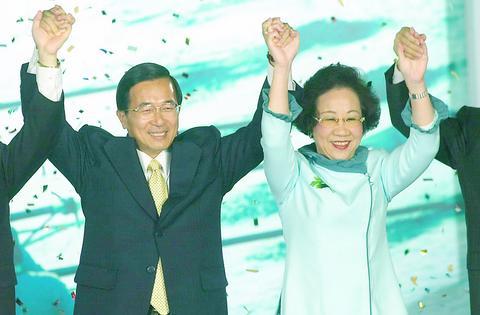Vice President Annette Lu (呂秀蓮) will be President Chen Shui-bian's (陳水扁) running mate in next year's election, despite fierce opposition within their Democratic Progressive Party (DPP).
One day after Chen was officially nominated as the DPP's standard bearer, he announced that Lu would be his running mate and called on all party members to unite to strive for victory.

PHOTO: CHIANG YING-YING, TAIPEI TIMES
Chen's choice of running mate had been a hot topic over the past few months, with Lu's opponents and supporters within the party clashing several times.
Chen yesterday said he had picked Lu once again because of her sound educational background, extensive experience and ability to work with him and to maintain "rule by both sexes."
In her acceptance speech, titled "Extraordinary Era, Extraordinary Future," Lu expressed her appreciation to Chen for choosing her again as his running mate. She said Taiwan would need "extraordinary leadership" in the "extraordinary era" that Taiwan faces in the fast-changing global society.
Lu said Taiwan would face many challenges, including the domestic problems of an aging population and the social impact of more mixed marriages, as well as changing cross-strait dynamics resulting from frequent economic and personnel interactions.
Lu warned the country must beware of Beijing's coaxing Taiwan into unification based on economic and trade ties and cultural integration with China.
She said Taiwan's lack of diplomatic power in major international bodies would result in the "further isolation and marginalization of Taiwan."
In such an "extraordinary era," Lu said Taiwan would need an "extraordinary leadership" to not only guide the country's continuing improvement in productivity, living standards and ecological protection, but also to ensure the nation's full sovereignty, clarify its national identity and normalize its international relations.
Before announcing his choice of running mate, Chen inducted five leaders of the DPP's campaign team. Premier Yu Shyi-kun was named director-general of the campaign headquarters and will lead the Cabinet in promoting the DPP's administrative record.
Taipei County Commissioner Su Tseng-chang (蘇貞昌) and Presidential Secretary-General Chiou I-jen (邱義仁) will be executive managers of the campaign organization. Su will also take charge of managing the campaign in the greater Taipei area, where the DPP is relatively weak compared with the pan-blue camp's Chinese Nationalist Party (KMT) and People First Party.
Kaohsiung Major Frank Hsieh (
DPP Secretary-General Chang Chun-hsiung (張俊雄) will coordinate operations between the party and the campaign headquarters.
Chang yesterday also set out the timetable for the party's campaign, saying that the DPP's national campaign headquarters would be established on Jan. 15 in Taipei.
Chang said the party would continue to push for the holding of a "defensive referendum," which Chen plans to hold on March 20, despite pressure from the US warning Taiwan not to hold such a vote.
In response to US criticism of the referendum, Chang yesterday acknowledged that the DPP administration had done too little to communicate its intentions to the US. He said the issue needed some time to "cool off" before the government could earn the trust of the US.
Also see story:
Volatile, vilified Annette Lu takes no prisoners, wether home or overseas

A Chinese aircraft carrier group entered Japan’s economic waters over the weekend, before exiting to conduct drills involving fighter jets, the Japanese Ministry of Defense said yesterday. The Liaoning aircraft carrier, two missile destroyers and one fast combat supply ship sailed about 300km southwest of Japan’s easternmost island of Minamitori on Saturday, a ministry statement said. It was the first time a Chinese aircraft carrier had entered that part of Japan’s exclusive economic zone (EEZ), a ministry spokesman said. “We think the Chinese military is trying to improve its operational capability and ability to conduct operations in distant areas,” the spokesman said. China’s growing

Nine retired generals from Taiwan, Japan and the US have been invited to participate in a tabletop exercise hosted by the Taipei School of Economics and Political Science Foundation tomorrow and Wednesday that simulates a potential Chinese invasion of Taiwan in 2030, the foundation said yesterday. The five retired Taiwanese generals would include retired admiral Lee Hsi-min (李喜明), joined by retired US Navy admiral Michael Mullen and former chief of staff of the Japan Self-Defense Forces general Shigeru Iwasaki, it said. The simulation aims to offer strategic insights into regional security and peace in the Taiwan Strait, it added. Foundation chair Huang Huang-hsiung

PUBLIC WARNING: The two students had been tricked into going to Hong Kong for a ‘high-paying’ job, which sent them to a scam center in Cambodia Police warned the public not to trust job advertisements touting high pay abroad following the return of two college students over the weekend who had been trafficked and forced to work at a cyberscam center in Cambodia. The two victims, surnamed Lee (李), 18, and Lin (林), 19, were interviewed by police after landing in Taiwan on Saturday. Taichung’s Chingshui Police Precinct said in a statement yesterday that the two students are good friends, and Lin had suspended her studies after seeing the ad promising good pay to work in Hong Kong. Lee’s grandfather on Thursday reported to police that Lee had sent

BUILDUP: US General Dan Caine said Chinese military maneuvers are not routine exercises, but instead are ‘rehearsals for a forced unification’ with Taiwan China poses an increasingly aggressive threat to the US and deterring Beijing is the Pentagon’s top regional priority amid its rapid military buildup and invasion drills near Taiwan, US Secretary of Defense Pete Hegseth said on Tuesday. “Our pacing threat is communist China,” Hegseth told the US House of Representatives Appropriations Subcommittee on Defense during an oversight hearing with US General Dan Caine, chairman of the Joint Chiefs of Staff. “Beijing is preparing for war in the Indo-Pacific as part of its broader strategy to dominate that region and then the world,” Hegseth said, adding that if it succeeds, it could derail